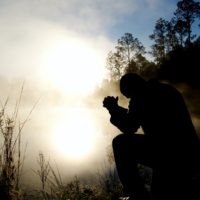‘God’s gonna trouble the water.’ This line in the African American spiritual ‘Wade in the Water’ refers to a passage in the gospel according to John, where we hear the story about Jesus healing a sick man at the pool of Bethzatha. Here we have a verse that is often omitted from contemporary Bible translations because it is probably a later addition to the original text and which says, “For an angel went down at a certain season into the pool, and troubled the water: whosoever then first after the troubling of the water stepped in was made whole of whatsoever disease he had.”
The angels trouble the water – God troubles the water – and miracles happen. Only when things are stirred up, troubled, change for the better, healing can happen.
This may feel strange or disconcerting to us – our first inclination when we hear the word ‘trouble’ is to expect something negative. He’s in trouble, that’s troublesome, she is nothing but trouble – these sentences don’t make us feel good. We are rather wary and on alert when we hear about or sense trouble.
But trouble can be seen and experienced as something that is good. ‘Wade in the Water’ wasn’t just a spiritual hymn that African Americans sang to praise God – its words also served as a code. ‘Wade in the Water’ was one of the songs that was used along the Underground Railroad, reminding those escaping slavery to ‘wade in the water’ and thus cover one’s tracks whenever possible – because ‘God’s gonna trouble the water’…
9 days ago, civil rights leader and Congressman John Robert Lewis passed away. If you turned on the TV or followed social media the day after his death, you will have heard people talk about him with love and respect, you will have heard Lewis’ remarkable story as a civil rights leader, you will have been reminded of the many meaningful and powerful things he said.
One of his more famous quotes is from 2018: “Do not get lost in a sea of despair. Be hopeful, be optimistic. Our struggle is not the struggle of a day, a week, a month, or a year, it is the struggle of a lifetime. Never, ever be afraid to make some noise and get in good trouble, necessary trouble.’ Now this is a fairly recent quote. However, Lewis already spoke of ‘good trouble’ in the early 60s, when he started out as a young Civil Rights leader – this term, this idea was one of his guiding principles throughout his life.
Good trouble –to many of us this concept may be a disquieting and disconcerting term, because we don’t like things to be stirred up, because we tend to live quite comfortably and don’t really want anything to change, at least not as it affects us. But God troubles the water – and miracles happen. Only when things are stirred up, troubled, change for the better, healing can happen.
Lewis was quite a troublemaker during his lifetime, a good troublemaker. As a young man, he joined the Civil Rights movement. While still a student, he became one of the original 13 ‘Freedom Riders’, peacefully challenging segregation in the South. He was beaten by police and angry mobs with clubs, pipes and baseball bats several times. After one of those beatings, he was left unconscious. He spend 40 days in jail for his impertinence. In 1965, he was one of the 600 peaceful protestors trying to cross the Edmund Pettus Bridge in Selma, Alabama, on their march to Montgomery. Alabama State troopers teargassed the protestors as they knelt down to pray and came down on them with brute force. Lewis’ skull was fractured.
This is not just distant history – this was just 55 years ago. And we see such violence again these days against peaceful protestors. Now this should be what disquiets and disconcerts us, and not the good trouble that is caused by people standing up for justice and equality…
Lewis was right. It is a struggle of a lifetime, a struggle, which continues. And we mustn’t give up.
Over the millennia, Christianity has become quite a domesticated religion, even the religion of the establishment in many parts of the world. However, we often forget that Jesus himself was quite the troublemaker. God’s gonna trouble the water, and God definitely stirred things up by sending the Son into the world.
Today’s gospel is a prime example for that. Who hasn’t heard the parable of the mustard seed, maybe drawn pretty pictures of a big mustard tree with birds sitting in its branches back in Sunday school. But the story of the mustard seed is a very subversive story. ‘The kingdom of heaven is like a mustard seed someone took and sowed in his field.’ Today, we don’t think much of it when we hear this line. Who doesn’t like mustard? But in Jesus’ days, nobody in their right mind would sow mustard in their field. Mustard was considered a weed – didn’t we just hear about weeds among the wheat last week? – because it would take over if left to its own devices, choking anything else growing.
Mustard would grow big – maybe not into a mighty tree, as Jesus suggests, but rather spread out rapidly, close to the ground. Mustard in Jesus’ days was trouble – big trouble. And yet Jesus uses this example for describing the kingdom of heaven, something that is troublesome and spreads like a pesky weed. God’s gonna trouble the water, God’s gonna trouble the powers that are, God’s gonna trouble the world, God’s gonna trouble – us.
And what is more troubling than seeing God dying on a cross? This turns the world and our understanding of power and might upside down. And it’s all good trouble – even though it may disquiet and disconcert us and cause us discomfort. Only when things are stirred up, troubled, change for the better, healing can happen.
I am certain that Lewis derived his notion of ‘good trouble’ from the Bible – he was steeped in faith, he went to seminary, studied the Scriptures, and became an ordained Baptist minister. And throughout his life, his faith was his guiding light. He, like many who experienced oppression and violence sanctioned by the law, preached the gospel as a force that liberates – liberates from sin and death, liberates from injustice we as human beings inflict on each other.
He also understood that the gospel liberates us from hate and grudge and calls us to forgive. Another of his famous quotes is, ‘You have to have the capacity and the ability to take what people did, and how they did it, and forgive them and move on.’
The gospel, the message of Christ which talks about the growth of God’s kingdom on earth wherever love, mercy and forgiveness abide instead of money and raw power, is trouble. It should disquiet us. It should disconcert us. It should call us into being good troublemakers ourselves, acting on our faith and beliefs, acting faithfully.
And no, it’s not safe. There will always be those for whom God’s kingdom as it is lived here on earth will be a pesky nuisance, something to be eradicated. We see in the example of John Lewis how the powers that are tried to quench the trouble.
But God needs holy and good troublemakers, like John Lewis. God needs holy and good troublemakers, like us. And though we may not be perfect in our strife to stir things up for the good and the healing of the world, God forgives us where we fall short and surrounds us with mercy and forgiveness, holding us in his everlasting care.
I want to close with one of my favorite quotes, which has also guided John Lewis – a quote by another good troublemaker, who stirred up Jews and Gentiles alike: the Apostle Paul. Words full of defiant hope and peaceful protest against the powers that are. ‘If God is for us, who is against us? Who will separate us from the love of Christ? Will hardship, or distress, or persecution, or famine, or nakedness, or peril, or sword? No, in all these things we are more than conquerors through him who loved us. For I am convinced that neither death, nor life, nor angels, nor rulers, nor things present, nor things to come, nor powers, nor height, nor depth, nor anything else in all creation, will be able to separate us from the love of God in Christ Jesus our Lord.’
To which I can only say: Amen.
This post is also available in: German





